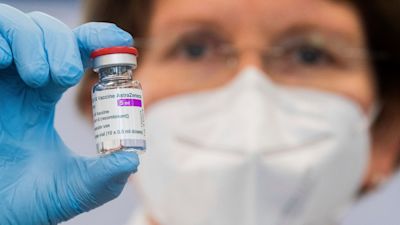Boris Johnson weighs in on row with EU over 'completely false' Covid vaccine export ban claims

ITV News Political Editor Robert Peston shares his views on the vaccine row
The Prime Minister has denied a claim by the European Union's top official that the UK had "blocked" the export of Covid vaccines.
Boris Johnson told MPs in the Commons: "We have not blocked the export of a single Covid-19 vaccine."
It comes amid a growing row which on Wednesday saw an EU diplomat summoned to the Foreign Office over European Council president Charles Michel's comments.
On Tuesday, Mr Michel accused Britain and the US of imposing an "outright ban" on the export of jabs, while hitting back at criticisms of the bloc’s vaccine rollout.
At Prime Minister’s Questions on Wednesday, Mr Johnson said: "We can be proud of the support the UK has given to the international Covid response, including the £548 million we have donated to Covax.
"I therefore wish to correct the suggestion from the European Council president that the UK has blocked vaccine exports.
"Let me be clear: we have not blocked the export of a single Covid-19 vaccine or vaccine components.
"This pandemic has put us all on the same side in the battle for global health, we oppose vaccine nationalism in all its forms."
The PM's comments echo those of Foreign Secretary Dominic Raab who hit back in a letter to Mr Michel, writing his claims were "completely false".
Last week, the EU flexed its new export control system for the first time, blocking a batch of vaccines which were intended for Australia, from leaving Italy
In his letter, Mr Raab said he sought to "set the record straight," writing: "Any references to a UK export ban or any restrictions on vaccines are completely false."
Mr Raab insisted the government "has not blocked a single Covid-19 vaccine or vaccine components", adding: "We are all facing this pandemic together."
Nicole Mannion, deputy ambassador of the EU to the UK, attended a meeting on Wednesday morning with the Foreign Office over the row.
A spokesman for the EU delegation said: “This morning Nicole Mannion, deputy ambassador of the EU to the UK and charge d’affaires at the EU Delegation to the UK attended a meeting at the request of the Foreign, Commonwealth and Development Office.
“We have no further comment at this stage.”
What the row over Covid-19 vaccines in Europe is all about:
There has been rising anger across Europe over the rollout of the vaccine.
At the start of the year Brussels demanded access to AstraZeneca vaccines manufactured in UK plants to make up for a shortfall after the pharmaceutical giant said it would have to cut the amount of doses delivered to the bloc by the end of March.
The company has always maintained the only reason the EU is behind in the supply of the vaccine is because the bloc took longer to sign off the jab and begin production.
The PA news agency understands the decision to hold a meeting was taken due to anger over the claim being repeated within the EU and the Commission - despite the UK correcting the record on each occasion.
Mr Michel, in a newsletter on Tuesday, said he was "shocked" when he heard allegations of vaccine nationalism levelled at the EU, saying: "The facts do not lie."
He added: "The United Kingdom and the United States have imposed an outright ban on the export of vaccines or vaccine components produced on their territory.
"But the European Union, the region with the largest vaccine production capacity in the world, has simply put in place a system for controlling the export of doses produced in the EU."
A government spokesperson was emphatic that no jabs had been blocked.
"The UK government has not blocked the export of a single Covid-19 vaccine. Any references to a UK export ban or any restrictions on vaccines are completely false," they said.
"This pandemic is a global challenge and international collaboration on vaccine development continues to be an integral part of our response."
In January, the EU briefly attempted to trigger Article 16 of the Northern Ireland Protocol of the Brexit Withdrawal Agreement to impose controls on vaccines.
But it swiftly backtracked after coming in for widespread criticism over the move, which came as it faced significant pressure over delays to the rollout of its vaccination programme.